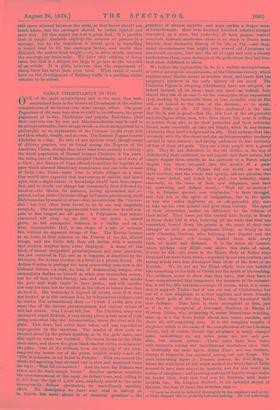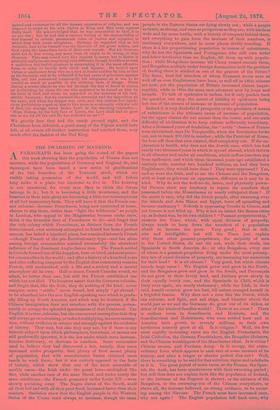EA RLY CHRISTIANITY IN FIJI.
ONE of the most extraordinary and at the same time best- ascertained facts in the history of Christianity is the sudden completeness of its victory over some savage tribes. The great raganisms of old were very slow to yield to its influence, the great paganism of to-day, Hindooism and popular Buddhism, yield their converts one by one, and Mahommedanism may be said to be unimpressionable, but a savage creed—a creed unsupported by a philosophy or an explanation of the Cosmos—yields every now and then utterly, finally, and at once. The Russian Pagans became Christian in a day. No relic of any African creed, though many of African practice, can be found among the Negroes of the American Union, though they have been there scarcely a century ; the whole population of Hawaii became Christian in ten years ; the ruling race of Madagascar adopted Christianity, as it were, at a blow ; the Karens of Pegu offered themselves for baptism at a pace which alarmed Missionary consciences, and one tribe at least of India—the Coles—came over in whole villages at a time. One would have expected that conversions so sudden and based upon such a slight extent of knowledge would have been imper- fect, and no doubt one change has occasionally been followed by another—the Hovas, for instance, having apostatised and re- pented, and an entire Christian village in Canara proclaiming itself Mahommedan by sound of drum—but, nevertheless, the "conver- sion" has very often been found to be in one way singularly complete. The ancient supernatural fears which one would sup- pose to last longest are all gone. A Polynesian that minute converted will chop up an idol, or cut down a sacred grove, or bid outrageous defiance to a visible and as it were, demoastrable Hell, in the shape of a lake of volcanic fire, without an apparent twinge of fear. The Karens become in an hour, in their relation to the „Powers of the Air, altered beings, and the Coles defy their old deities with a serenity that modern sceptics have never displayed. A scene of this kind, of almost unequalled picturesqueness and even grandeur, has just occurred in Fiji, and as it happens, is described by the Governor, Sir Arthur Gordon, in a letter to a private friend. Sir Arthur Gordon is perhaps the most noteworthy man now in the Colonial Service,—a man, we fear, of domineering temper, who accumulates dislikes on himself as other men accumulate money, but for all that, a God-fearing, just, and able man, who thinks the poor and weak ought to have justice, and will sacrifice not only his time but his comfort in the effort to insure that they do have it. His testimony is beyond all doubt, even if it were not backed, as in this instance it is, by independent evidence, and he relates this extraordinary story :—" I wish I could give you some idea of the intense picturesqueness and curious events of this last month. One I must tell you. The Christian army was encamped round Bukatia, a very strong place, a vast mass of rock rising somewhat like the Acrocorinthus, above the river and the plain. This town had never been taken, and was regarded as impregnable by the cannibals. The oracles of their gods are shouted aloud by the priests speaking as in the gods' name, and this night an oracle was declared. The moon shone on the white river-mists, and threw the great black shadow of the rock far over the plain. Out of the stillness, from the very top of the rock, rang out the hoarse cry of the priest, audible nearly a mile off, Fire is unknown to my house in Bukatia.' With one accord the whole beleaguering host shouted out in slow and measured tones the reply, Wait till to-morrow And the next day Bukatia was taken and the devil-temple burnt." Another narrator mentions -the spontaneousness of the reply, its defiant tone, and, rolling as it did from the lips of 1,400 men, suddenly moved to the same triumphantly - defiant ejaculation, its marvellously startling effect. No description we have ever read in history or in fiction has more about it of dramatic grandeur — the
grandeur of intense surprise—and none excites a deeper sense of bewilderment. Here were fourteen hundred criminal savages converted, as it were, but yesterday, all born pagans, trained cannibals, habitual murderers—there is no story in Dante more horrible than Jackson's history of his life in Fiji,—and they, under circumstances that might have moved old Christians to awe-struck emotion, hurl into the air at night and with a bloody battle before them, open defiances to the gods whom they had been bred since childhood to adore.
We believe the explanation to be in a certain incompleteness, or rather incomplete completeness, of the Christian victory, which explains many similar scenes in modern story, and much that has perplexed students in the early history of our creed. The Christian Fijians in adopting Christianity have not adopted, or indeed learned, all its ideas ; have not risen—as, indeed, how should they rise all at once ?—to the conception of an impersonal God, working by immutable lame, or laws mutable only at His will,—or indeed to the idea of the distance, so to speak, of the Deity at all. All they have embraced is the idea that He is, and is good—that He, this God of the all-powerful and intelligent white men, who lives above but near, is willing to receive them also, to be their protector and their sovereign friend, more especially, as they are taught, when in any human extremity they need a helper and an ally. They embrace that idea intensely, with the directness and the anthropomorphic tendency natural to such natures ; and having embraced it, lose instantly all fear of their old gods. They are a little people with a grand ally. They do not disbelieve in the old deities, in the way of disbelieving their existence, do not inquire into their nature, but simply despise them utterly, as the servants of a Baron might despise him when accepted into the service of a great King. The Christian Fijians did not doubt, as we read their conduct, that the oracle had spoken, did not question that they were defied, and defied by a god ; but instantly, simul- taneously, in the name of their new allegiance, sent back the answering and defiant shout,—" Wait till to-morrow!" "In te Domine speravi, non confundar," is their thought, and this not in the spirit of resignation, but in the spirit of one who relies implicitly on an all-powerful ally, sure to take up his own quarrel and give them victory. The speed of their conversion makes no difference to the fullness of their belief. They have got this central idea firmly, as firmly as those Jews had it who, believing all the while that Baal was somewhat, hewed down his priests in the name of their own stronger as well as more legitimate Deity ; as firmly as the early Christian Doctors, who, believing that Jupiter and the rest were potent evil beings, loaded them with every form of insult and defiance. It is the scene on Cannel, where perhaps only Elijah rose above this state of mind, if even he did,—the scene in the Mecca Holy of Holies when Ozza and Lat were hewn down,—repeated in our own century, and among minds even less developed than those of the Jews or the Koreish. We do not say the Fijian chiefs have not imbibed also something of the faith of Christ and the spirit of his teaching. The evidence seems to show that they have, that they have at least comprehended that vengeance, the massacre of the unresist- ing, is not for His servants—except, of course, when it is neces- sary to support Turks—but it was not out of Christianity, but out of a new allegiance to a God mightier and more friendly than their gods of the day before, that they thundered back that defiance. That faith is their stronghold at first, just as it is the stronghold of low-caste Hindooa or Blacks of Western Africa, who, embracing it, under Mussulman teaching, start up in a day from feeble slaves into brave, resolute, and above all, self-respecting men. It is the complete transfer of allegiance which is the cause of the completeness of the Christian victory, and of course, though the allegiance is rarely changed again, backslidings on any other point are not only pos- sible, but almost certain. There must have been many such instances among our Scandinavian forefathers since Olaf, in identically the same spirit, defied Thor ; and one instance, strange to bizarrerie, has occurred among our own Kings. The most interesting figure in Norman history, the Red King, in whom the wild force of will which marked the whole line of Rollo seemed to have risen almost to insanity, had for sole creed this notion of allegiance ; and knowing nothing of loyalty except under its feudal form, held that God was his Suzerain, with duties towards him. Mr. Langton Sanford, in his splendid sketch of the man, the best of many fine sketches, says :— " I have no doubt he believed thoroughly in the existence and power of God,—beyond this he probably believed nothing. He had a thorough hatred and contempt for all the human apparatus of religion, and was disponed to stand on his own rights as King and Man even against Deity itself. He acknowledged that he was responsible to God, if to no one else ; but he had also a curious feeling of the responsibility of God himself to certain paramount rules of justice and injustice, to which they both owed allegiance. Perhaps he regarded God as his Suzerain, just as he himself was the Suzerain of his great nobles, and they again the immediate lords of their own vassals. But his Suzerain must not do him wrong, any more than he ought to do wrong to that Suzerain. This may sound very like impiety to many, but to Rufus it probably really meant something very different, though doubtless he took a malicious but foolish pleasure in enunciating it in the most offensive form, in order to horrify both clerk and layman. He looked upon virtue or abstinence from vice as a sort of feudal aid due by him to God as his Suzerain, and to be withheld if he had cause of grievance against Him, and had renounced tomporarily his allegiance, as it was to be evaded as much as possible in the ordinary state of things. When during a severe illness he was led through the fear of death to choose an Archbishop, he chose the one who appeared to be forced on him by the hand of God, and whom he regarded as the nominee of his irre- sistible Suzerain ; but he resented the necessity and the imposition all the same, and when the danger was over, and the zealous but injudi- cious Archbishop urged on him to live more in conformity with the will of God, his strange creed broke forth in the startling rejoinder,— ' Hear, Bishop, by the holy face of Lucca, the Lord shall find no good one in me for all the evil He has inflicted on me ! '"
We greatly fear that had the oracle proved right, and the Christians been defeated, a good many of the Fijians would have felt, at all events till further instruction had reached them, very much after the fashion of the Red King.



































 Previous page
Previous page